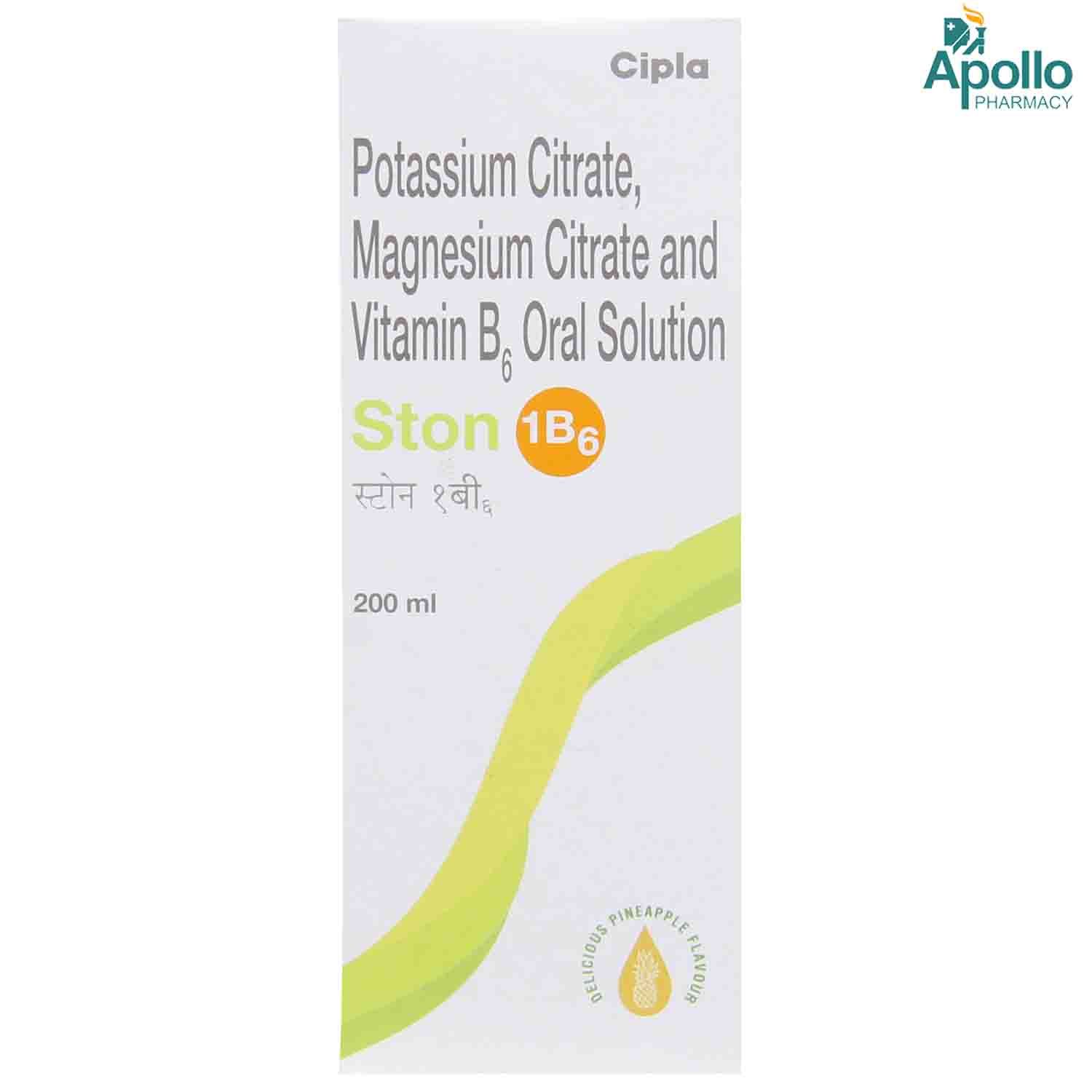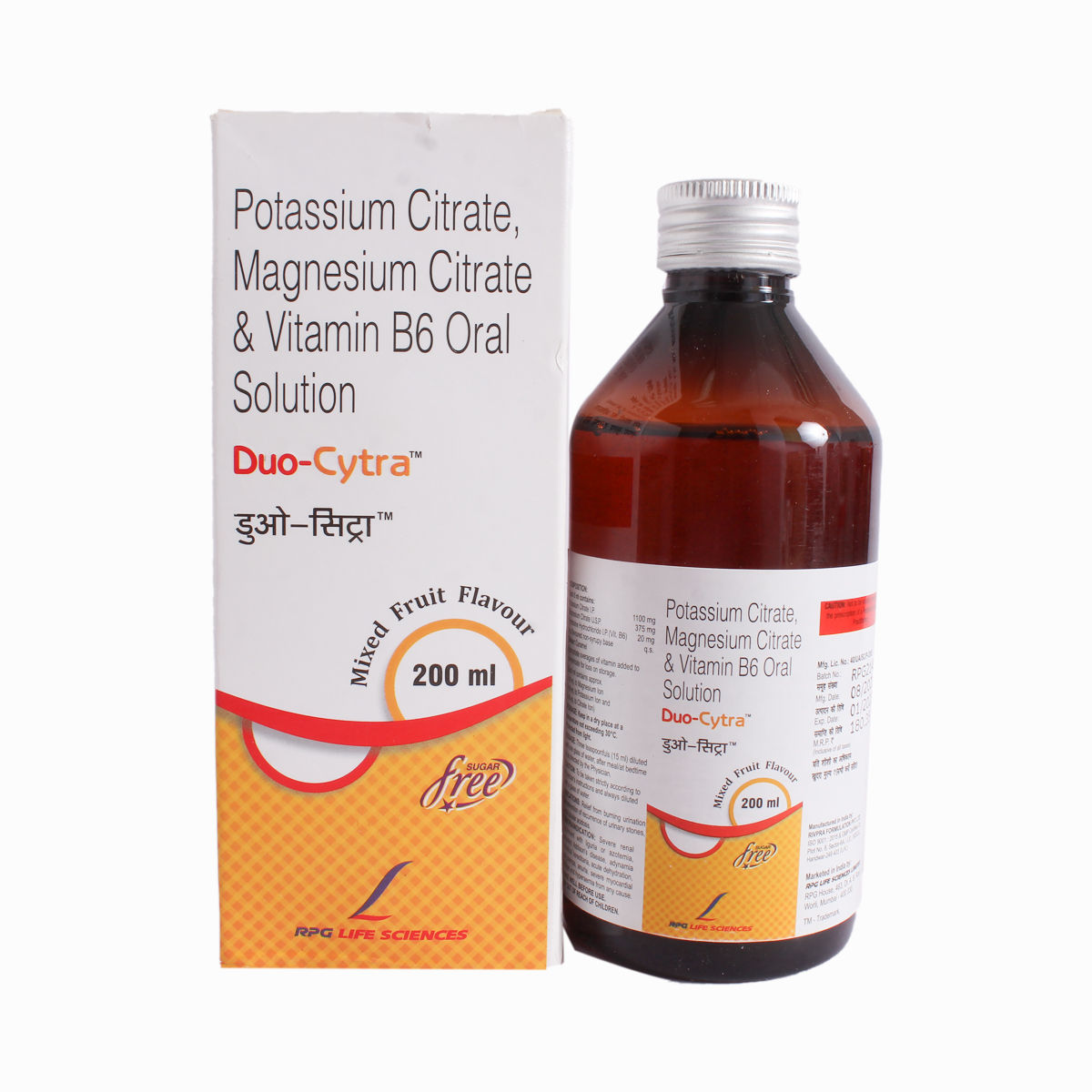POTASSIUM CITRATE+MAGNESIUM CITRATE+PYRIDOXINE HYDROCHLORIDE
About POTASSIUM CITRATE+MAGNESIUM CITRATE+PYRIDOXINE HYDROCHLORIDE
POTASSIUM CITRATE+MAGNESIUM CITRATE+PYRIDOXINE HYDROCHLORIDE is indicated for the treatment of renal tubular acidosis and kidney stones. It also helps provide relief from the burning sensation during urination. Kidney stones are small, hard deposits made up of calcium, phosphate, and other minerals/acid salts that stick together in concentrated urine. Renal tubular acidosis is a condition in which the kidneys fail to excrete acids into the urine, this causes the blood to remain too acidic.
POTASSIUM CITRATE+MAGNESIUM CITRATE+PYRIDOXINE HYDROCHLORIDE is a combination of three drugs, namely: Magnesium citrate, Potassium citrate, and Pyridoxine hydrochloride. POTASSIUM CITRATE+MAGNESIUM CITRATE+PYRIDOXINE HYDROCHLORIDE raises the urinary pH, potassium, magnesium, and citric acid levels; this prevents the crystallization, growth, and accumulation of stone-forming salts.
Take POTASSIUM CITRATE+MAGNESIUM CITRATE+PYRIDOXINE HYDROCHLORIDE as prescribed. You are advised to take POTASSIUM CITRATE+MAGNESIUM CITRATE+PYRIDOXINE HYDROCHLORIDE for as long as your doctor has recommended it for you, depending on your medical condition. In some cases, you may experience certain common side effects such as abdominal discomfort, diarrhoea, nausea, and vomiting. Most of these side effects do not require medical attention and will resolve gradually over time. However, you are advised to talk to your doctor if you experience these side effects persistently.
Consult your doctor before taking POTASSIUM CITRATE+MAGNESIUM CITRATE+PYRIDOXINE HYDROCHLORIDE if you are pregnant or breastfeeding. POTASSIUM CITRATE+MAGNESIUM CITRATE+PYRIDOXINE HYDROCHLORIDE is not recommended for children as safety and effectiveness have not been established. POTASSIUM CITRATE+MAGNESIUM CITRATE+PYRIDOXINE HYDROCHLORIDE is not recommended for patients with renal insufficiency as it might increase the risk for the development of hyperkalemia (high potassium levels) and soft tissue calcification. Keep your doctor informed about your health condition and medicines to rule out any side effects.
Uses of POTASSIUM CITRATE+MAGNESIUM CITRATE+PYRIDOXINE HYDROCHLORIDE
Medicinal Benefits
POTASSIUM CITRATE+MAGNESIUM CITRATE+PYRIDOXINE HYDROCHLORIDE is a combination of three drugs, namely: Magnesium citrate, Potassium citrate, and Pyridoxine hydrochloride. POTASSIUM CITRATE+MAGNESIUM CITRATE+PYRIDOXINE HYDROCHLORIDE is indicated for the treatment of renal tubular acidosis, kidney stones, prevents recurrence of calcium oxalate nephrolithiasis (calcium oxalate stones) and uric acid lithiasis (uric acid stones) with or without calcium stones. It also helps provide relief from the burning sensation during urination. POTASSIUM CITRATE+MAGNESIUM CITRATE+PYRIDOXINE HYDROCHLORIDE raises the urinary pH, potassium, magnesium, and citric acid levels; this prevents the crystallization, growth, and accumulation of stone-forming salts.
Directions for Use
Storage
Side Effects of POTASSIUM CITRATE+MAGNESIUM CITRATE+PYRIDOXINE HYDROCHLORIDE
- Abdominal discomfort
- Diarrhoea
- Vomiting
- Nausea
Patients Concern
Disease/Condition Glossary
Kidney stones: Nephrolithiasis, also known as kidney stones, is a disease affecting the urinary tract. Kidney stones are small, hard deposits made up of calcium, phosphate, and other minerals/acid salts that stick together in concentrated urine. They are the common cause of blood in urine and can be painful when passing through the urinary tract. Symptoms include severe pain, usually in one side of the abdomen, and nausea.
Renal tubular acidosis: It is a condition that involves the accumulation of acid in the body due to the failure of the kidneys to acidify the urine appropriately. The kidneys fail to excrete acids into the urine, which causes the blood to remain too acidic. If not treated, it could lead to kidney stones, bone disease, kidney disease, or failure.
FAQs
POTASSIUM CITRATE+MAGNESIUM CITRATE+PYRIDOXINE HYDROCHLORIDE raises the urinary pH, potassium, magnesium and citric acid levels; this prevents the crystallisation of stone-forming salts.
Do not discontinue POTASSIUM CITRATE+MAGNESIUM CITRATE+PYRIDOXINE HYDROCHLORIDE without consulting your doctor. To treat your condition effectually, continue taking POTASSIUM CITRATE+MAGNESIUM CITRATE+PYRIDOXINE HYDROCHLORIDE for as long as prescribed. Do not be reluctant to speak with your doctor if you feel any difficulty while taking POTASSIUM CITRATE+MAGNESIUM CITRATE+PYRIDOXINE HYDROCHLORIDE.
Avoid taking POTASSIUM CITRATE+MAGNESIUM CITRATE+PYRIDOXINE HYDROCHLORIDE if you have peptic ulcers as POTASSIUM CITRATE+MAGNESIUM CITRATE+PYRIDOXINE HYDROCHLORIDE has ulcerogenic potential, which could lead to further ulceration. Consult your doctor if you have any concerns.
Diarrhoea might be a side-effect of POTASSIUM CITRATE+MAGNESIUM CITRATE+PYRIDOXINE HYDROCHLORIDE. Drink lots of fluids and eat non-spicy food if you experience diarrhoea. If you find blood in stools (tarry stools) or if you have severe diarrhoea consult your doctor. Do not take anti-diarrheal medicine on your own.
Consult a doctor before taking POTASSIUM CITRATE+MAGNESIUM CITRATE+PYRIDOXINE HYDROCHLORIDE if you have an active urinary tract infection as POTASSIUM CITRATE+MAGNESIUM CITRATE+PYRIDOXINE HYDROCHLORIDE increases the urinary pH, which might promote further bacterial growth.
Available Medicines for
POTASSIUM CITRATE+MAGNESIUM CITRATE+PYRIDOXINE HYDROCHLORIDE

Citabest-B6 Sugar Free Raspberry Flavour Oral Suspension 200 ml
1 Bottle
₹180 (MRP 200)10%Off
cashback: 0









